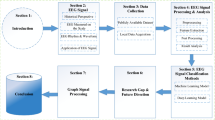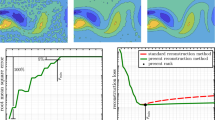Abstract
Electrocardiogram (ECG) is one of the major methods for the diagnosis of heart malfunctions. ECG signals are susceptible to both high-frequency and low-frequency noises such as electromyography (EMG), power line interference (PLI) and baseline wander noises, respectively. These noises deteriorate the quality of ECG signals and challenge the proper identification of heart illnesses. In this article, we report an improved fully adaptive method for canceling high-frequency noises using the empirical mode decomposition (EMD) with the modified indirect subtraction and adaptive window techniques. As high-frequency noises are approximately of zero mean and lower-order intrinsic mode functions (IMFs) contain high-frequency noises, a statistical test is performed to determine whether a particular combination of IMFs has zero mean. First, to remove the PLI noise, the modified indirect subtraction technique is used. The sum of IMFs which are dominated by the noise is passed to a Butterworth band-pass filter, and the resultant filtered signal is subtracted directly from the noisy ECG signal. Then, the EMG noise is removed by an improved adaptive window-based noise reduction technique. By exploiting this technique, in contrast to common EMD-based methods, the duration of the QRS complex is computed regarding the location of the peak of the R wave and the widest possible QRS complex which makes the proposed technique applicable to all types of ECG signals. The quantitative results of simulations performed on several records from the MIT–BIH arrhythmia database prove the better performance of the proposed method than the compared methods at different noise levels.












Similar content being viewed by others
References
M.A. Awal, S.S. Mostafa, M. Ahmad, M.A. Rashid, An adaptive level dependent wavelet thresholding for ECG denoising. Biocybern. Biomed. Eng. 34(4), 238–249 (2014)
M. Blanco-Velasco, B. Weng, K.E. Barner, ECG signal denoising and baseline wander correction based on the empirical mode decomposition. Comput. Biol. Med. 38(1), 1–13 (2008)
C.J. De Luca, Surface electromyography: detection and recording. DelSys Incorporated 10(2), 1–10 (2002)
M. García, M. Martínez-Iniesta, J. Ródenas, J.J. Rieta, R. Alcaraz, A novel wavelet-based filtering strategy to remove powerline interference from electrocardiograms with atrial fibrillation. Physiol. Meas. 39(11), 115006 (2018)
A.L. Goldberger, Z.D. Goldberger, A. Shvilkin, Goldberger’s Clinical Electrocardiography: a simplified approach, 8th edn. (Elsevier, 2012)
A.L. Goldberger, L.A. Amaral, L. Glass, J.M. Hausdorff, P.C. Ivanov, R.G. Mark, J.E. Mietus, G.B. Moody, C.-K. Peng, H.E. Stanley, Physiobank, physiotoolkit, and physionet. Circulation 101(23), e215–e220 (2000)
L.D.F.D.T. Help, Filter specifications (Digital Filter Design Toolkit). http://zone.ni.com/reference/en-XX/help/371325F-01/lvdfdtconcepts/dfd_filter_spec/ (2011). Accessed 17 Feb 2019
N.E. Huang, Z. Shen, S.R. Long, M.C. Wu, H.H. Shih, Q. Zheng, N.-C. Yen, C.C. Tung, H.H. Liu, The empirical mode decomposition and the Hilbert spectrum for nonlinear and non-stationary time series analysis, in Proceedings of the Royal Society of London A: Mathematical, Physical and Engineering Sciences, vol. 1971 (The Royal Society, 1998), pp. 903–995
S. Jamwal, Power line interference cancellation in ECG signals using Alpha-Beta filter, in 2012 IEEE International Conference on Signal Processing, Computing and Control (ISPCC) (IEEE, 2012), pp. 1–6
M.A. Kabir, C. Shahnaz, Denoising of ECG signals based on noise reduction algorithms in EMD and wavelet domains. Biomed. Signal Process. Control 7(5), 481–489 (2012)
W.M. Laghari, M.U. Baloch, M.A. Mengal, S.J.J.C. Shah, Systems: performance analysis of analog butterworth low pass filter as compared to Chebyshev type-I filter, Chebyshev type-II filter and elliptical filter. Circuits Syst. 5(09), 209 (2014)
C. Levkov, G. Mihov, R. Ivanov, I. Daskalov, I. Christov, I. Dotsinsky, Removal of power-line interference from the ECG: a review of the subtraction procedure. BioMed. Eng. OnLine 4(1), 50 (2005)
J. Mateo, E.M. Sánchez-Morla, J. Santos, A new method for removal of powerline interference in ECG and EEG recordings. Comput. Electr. Eng. 45, 235–248 (2015)
G.B. Moody, R.G. Mark, The impact of the MIT–BIH arrhythmia database. IEEE Eng. Med. Biol. Mag. 20(3), 45–50 (2001)
G.B. Moody, W. Muldrow, R.G. Mark, A noise stress test for arrhythmia detectors. Comput. Cardiol. 11(3), 381–384 (1984)
A. Němcová, R. Smíšek, L. Maršánová, L. Smital, M. Vítek, A comparative analysis of methods for evaluation of ECG signal quality after compression. BioMed research international 2018 (2018)
A.J. Nimunkar, W.J. Tompkins, EMD-based 60-Hz noise filtering of the ECG, in 29th Annual International Conference of the IEEE 2007, Engineering in Medicine and Biology Society, 2007. EMBS 2007 (IEEE, 2007) pp. 1904–1907
S. Pal, M. Mitra, Empirical mode decomposition based ECG enhancement and QRS detection. Comput. Biol. Med. 42(1), 83–92 (2012)
J. Pan, W.J. Tompkins, A real-time QRS detection algorithm. IEEE Trans. Biomed. Eng. 32(3), 230–236 (1985)
S. Poungponsri, X.-H. Yu, An adaptive filtering approach for electrocardiogram (ECG) signal noise reduction using neural networks. Neurocomputing 117, 206–213 (2013)
M. Rakshit, S. Das, An efficient ECG denoising methodology using empirical mode decomposition and adaptive switching mean filter. Biomed. Signal Process. Control 40, 140–148 (2018)
S. Saha, S. Das, C. Nandi, Harmonics analysis of power electronics loads. Int. J. Comput. Appl. 92(10), 32–36 (2014)
M. Sandhu, S. Kaur, J. Kaur, A study on design and implementation of Butterworth, Chebyshev and elliptic filter with Matlab. Int. J. Emerg. Technol. Eng. Res. 4(6), 111–114 (2016)
P. Singh, G. Pradhan, S. Shahnawazuddin, Denoising of ECG signal by non-local estimation of approximation coefficients in DWT. Biocybern. Biomed. Eng. 37(3), 599–610 (2017)
M. Suchetha, N. Kumaravel, Empirical mode decomposition based filtering techniques for power line interference reduction in electrocardiogram using various adaptive structures and subtraction methods. Biomed. Signal Process. Control 8(6), 575–585 (2013)
M. Suchetha, N. Kumaravel, M. Jagannath, S.K. Jaganathan, A comparative analysis of EMD based filtering methods for 50 Hz noise cancellation in ECG signal. Inform. Med. Unlocked 8, 54–59 (2017)
M.O. Sweeney, A.S. Hellkamp, K.A. Ellenbogen, A.J. Greenspon, R.A. Freedman, K.L. Lee, G.A. Lamas, Adverse effect of ventricular pacing on heart failure and atrial fibrillation among patients with normal baseline QRS duration in a clinical trial of pacemaker therapy for sinus node dysfunction. Circulation 107(23), 2932–2937 (2003)
B. Weng, M. Blanco-Velasco, K.E. Barner, ECG denoising based on the empirical mode decomposition, in 2006 International Conference of the IEEE Engineering in Medicine and Biology Society (IEEE, 2006), pp. 1–4
G.S. Yadav, S. Yadav, Time and frequency exploration of ECG signal. Int. J. Comput. Appl. 67(4), 246–249 (2013)
Author information
Authors and Affiliations
Corresponding author
Ethics declarations
Conflict of interest
The authors declare that they have no conflict of interest.
Human and Animals Participants
This article does not contain any studies with human participants or animals performed by any of the authors.
Informed Consent
For this type of study, formal consent is not required.
Additional information
Publisher's Note
Springer Nature remains neutral with regard to jurisdictional claims in published maps and institutional affiliations.
Rights and permissions
About this article
Cite this article
Abdollahpoor, R., Lotfivand, N. Fully Adaptive Denoising of ECG Signals Using Empirical Mode Decomposition with the Modified Indirect Subtraction and the Adaptive Window Techniques. Circuits Syst Signal Process 39, 4021–4046 (2020). https://doi.org/10.1007/s00034-020-01350-9
Received:
Revised:
Accepted:
Published:
Issue Date:
DOI: https://doi.org/10.1007/s00034-020-01350-9




